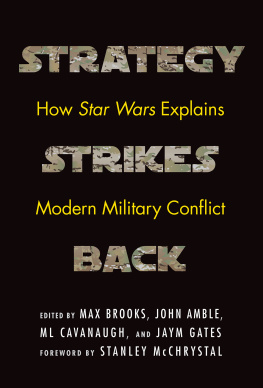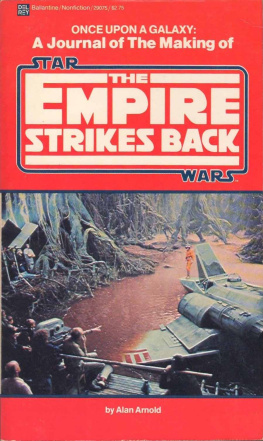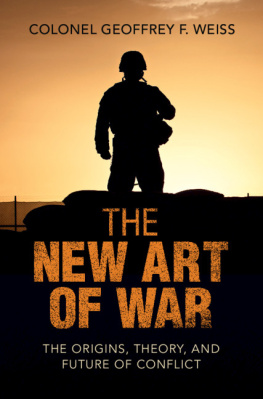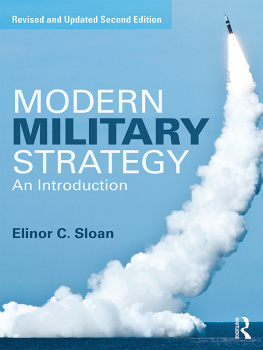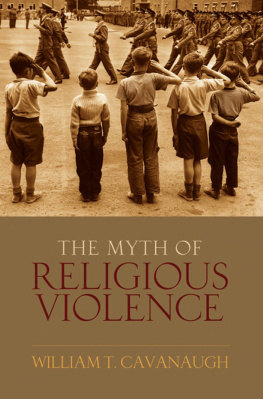ML Cavanaugh (editor) - Strategy strikes back : how Star Wars explains modern military conflict
Here you can read online ML Cavanaugh (editor) - Strategy strikes back : how Star Wars explains modern military conflict full text of the book (entire story) in english for free. Download pdf and epub, get meaning, cover and reviews about this ebook. year: 2018, genre: Politics. Description of the work, (preface) as well as reviews are available. Best literature library LitArk.com created for fans of good reading and offers a wide selection of genres:
Romance novel
Science fiction
Adventure
Detective
Science
History
Home and family
Prose
Art
Politics
Computer
Non-fiction
Religion
Business
Children
Humor
Choose a favorite category and find really read worthwhile books. Enjoy immersion in the world of imagination, feel the emotions of the characters or learn something new for yourself, make an fascinating discovery.
- Book:Strategy strikes back : how Star Wars explains modern military conflict
- Author:
- Genre:
- Year:2018
- Rating:4 / 5
- Favourites:Add to favourites
- Your mark:
- 80
- 1
- 2
- 3
- 4
- 5
Strategy strikes back : how Star Wars explains modern military conflict: summary, description and annotation
We offer to read an annotation, description, summary or preface (depends on what the author of the book "Strategy strikes back : how Star Wars explains modern military conflict" wrote himself). If you haven't found the necessary information about the book — write in the comments, we will try to find it.
Strategy strikes back : how Star Wars explains modern military conflict — read online for free the complete book (whole text) full work
Below is the text of the book, divided by pages. System saving the place of the last page read, allows you to conveniently read the book "Strategy strikes back : how Star Wars explains modern military conflict" online for free, without having to search again every time where you left off. Put a bookmark, and you can go to the page where you finished reading at any time.
Font size:
Interval:
Bookmark:
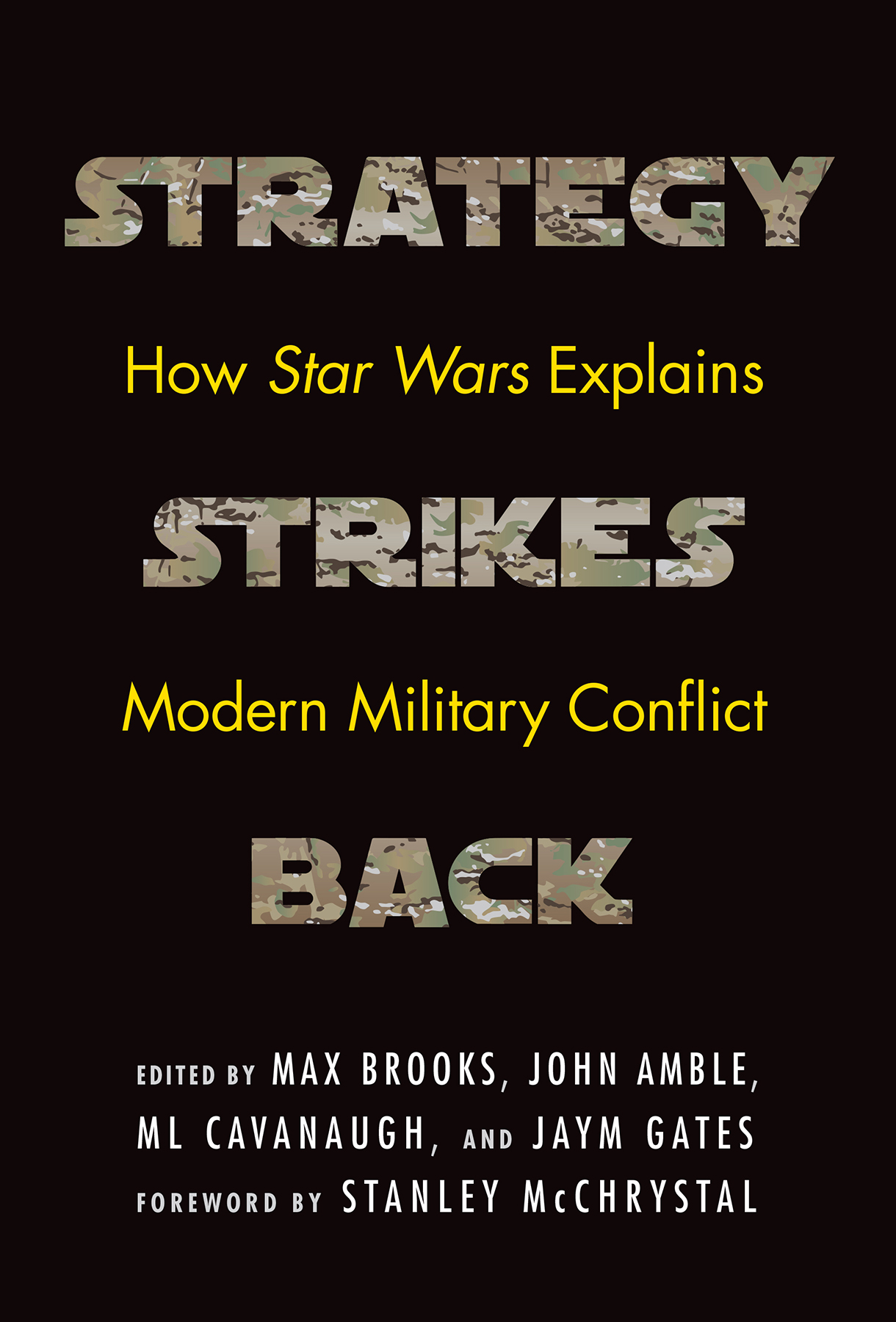
Star Wars is just as much a foundational mythology of our time as The Iliad was a long time ago. Strategy Strikes Back ingeniously uses that world far, far away to help readers take a look at our wars here today.
P. W. Singer, best-selling author of Wired for War and coauthor of Ghost Fleet: A Novel of the Next World War
Over the course of history, our single greatest vulnerability has been a failure of imagination. Strategy Strikes Back confronts that vulnerability. The future may not evolve precisely as these authors suggest, but evolve it will. As it does, we will discover that some of tomorrows challenges will prove to be timeless, and others surprisingly new. Learning to imagine now will be time well spent.
Gen. Martin Dempsey, former chairman of the Joint Chiefs of Staff
Edited by Max Brooks, John Amble, ML Cavanaugh, and Jaym Gates
Foreword by Stanley McChrystal
Potomac Books | An imprint of the University of Nebraska Press
2018 by Max Brooks, John Amble, ML Cavanaugh, and Jaym Gates
Cover designed by University of Nebraska Press; camouflage pattern PavloKyiv/Shutterstock.com; title logo designed with FlamingText.com.
All rights reserved. Potomac Books is an imprint of the University of Nebraska Press.
Library of Congress Control Number: 2017044550
This book is not licensed, authorized, or endorsed by Lucasfilm Ltd. LLC .
The publisher does not have any control over and does not assume any responsibility for author or third-party websites or their content.
This book is proud to support the Wounded Warrior Project. For more information about the organization, or its mission to honor and empower Wounded Warriors, please visit woundedwarriorproject.org.

Stanley McChrystal
ML Cavanaugh
Max Brooks
Max Brooks
Jim Golby
Crispin J. Burke
Mick Cook
Daniel D. Maurer
Raq Winchester and Fran Wilde
Erica Iverson
Kelsey D. Atherton
Mick Ryan
Steve Leonard
BJ Armstrong
B. A. Friedman
Jean Marie Ward
Dan Ward
James Stavridis and Colin Steele
Chuck Bies
Steve Metz
Jonathan Bratten
Andrew Liptak
Chuck Bies
August Cole
Liam Collins
John Spencer
Van Jackson
Theresa Hitchens
Kathleen J. McInnis
Craig Whiteside
ML Cavanaugh
ML Cavanaugh
Stanley McChrystal
I remember the attack on the Death Star. Its approach threatened defeat of the Rebel cause, but destroying the ominous warship required a perfectly precise bombing run conducted through a gauntlet of enemy fighters and fire. Pilot and budding Jedi knight Luke Skywalker does it with notable skill and awesome courage. The Death Star explodes across the screen, and the movie concludes with a triumphant ceremony.
The Rebel attack was dramatic and successful but hardly decisive or strategic. The very title of the next film in the series, The Empire Strikes Back, signaled that the war was far from over, and we see Luke Skywalker journey to his roots in order to develop the Jedi skills he will need for an extended struggle. Lukes preparation is reminiscent of Mao Tse-tungs doctrine of three phases of a peoples war.
The study of strategy is a never-ending labor. In its best practice, we identify the necessary ways and means to achieve our desired endsor more simply put, we determine an outcome that is realistically achievable and commit ourselves to devoting the resources and taking the actions necessary to gain that outcome. It demands rigorous integrity in predicting the costs we must bear to attain success and a moral pledge to stay the course.
Too often we produce faux strategy by underestimating the difficulties we must overcome, by ignoring the limitations of our force, or by assuming a level of commitment to the cause that proves illusory. Rebellions, whether against the Galactic Empire or another powerful entity, are frequently ignited by firebrand ideologues but, after the romance has faded, are typically the progeny of relentlessly dedicated, harshly realistic operators. Strategies produced at the outset of almost every war give way to less ambitious but more realistic plans when tempered and shaped in realitys forge.
It can feel frivolous to ascribe lessons in strategy to popular movies, much less to science fiction in particular. The characters and events spring from the imaginations and keyboards of clever people, but they arent realnone of this really happened (yet).
But thats a narrow view, the kind that proclaims art impractical or history irrelevant. In fact, fiction offers an extraordinary opportunity to craft a narrative that highlights both the challenges and criticality of viable strategy while controlling for other considerations. In weighing history, we often argue over the facts or allow aspects of personality to color our view. There are an infinite number of variables to be factored and disputed, which often distracts us from a clear-eyed assessment of strategy.
Of course, with science fiction, we often suspend disbelief to accept the excitement of the story; but as with Stars Wars, thats no reason the concepts of strategy shown have to be unbelievable. In fact, throughout the series there are repeated depictions of characters and situations that invite the analysis of serious students of strategy.
Like many things in life, the appropriateness and viability of a strategy is best evaluated in the rearview mirrorbut life rarely drives in reverse. Many readers of this book have developed and executed strategies of significant importance and will continue to do so, but no one could ever master the craft beyond the need for continuous study.
Wisdom is where you find it. Dont be afraid to look in unexpected places. This is a great place to start.
ML Cavanaugh
In teaching strategy at West Point, I learned something important about myself. Ive been on both the wrong end of incoming insurgent fire and the receiving end of cadets blank stares; and if I were forced to decide between the two, Im not sure I could. Bullets whizzing versus eyes blinking? Deafening shells or awkward silence? A radio malfunction at our units most dangerous moment, or a smartphone reach during my lectures most boring minute? Who could choose? Or the never-sure calculation about whether my soldiers, or students, were laughing at my jokeor at me. But above all else, the classroom left me with the distinct fear that I hadnt adequately prepared my soon-to-be second lieutenants for the battlefields to come. The stakes are higher in military classrooms. War and teaching about war stiffen the spine and sharpen the senses, because in either one, failure carries a steep price.
Author Neil Gaiman once advised college students to make good art; but if youre a U.S. Army major assigned to teach the subject I taught, in the place I was, your professional obligation to society is somewhat differentyou want your undergraduates to make good war.
But a few shiny trophies didnt prevent reflection on what more I couldve done during my time teaching. By the summer of 2015 I moved on from West Point to an assignment in South Korea, where I wrote the war plan for a forward-stationed infantry division roughly a half marathon from the DMZ . Distance didnt relieve me from my chief concernin my mind the greatest challenge in teachingwhich was to find common and interesting terrain to use for the study of strategy.
Font size:
Interval:
Bookmark:
Similar books «Strategy strikes back : how Star Wars explains modern military conflict»
Look at similar books to Strategy strikes back : how Star Wars explains modern military conflict. We have selected literature similar in name and meaning in the hope of providing readers with more options to find new, interesting, not yet read works.
Discussion, reviews of the book Strategy strikes back : how Star Wars explains modern military conflict and just readers' own opinions. Leave your comments, write what you think about the work, its meaning or the main characters. Specify what exactly you liked and what you didn't like, and why you think so.

